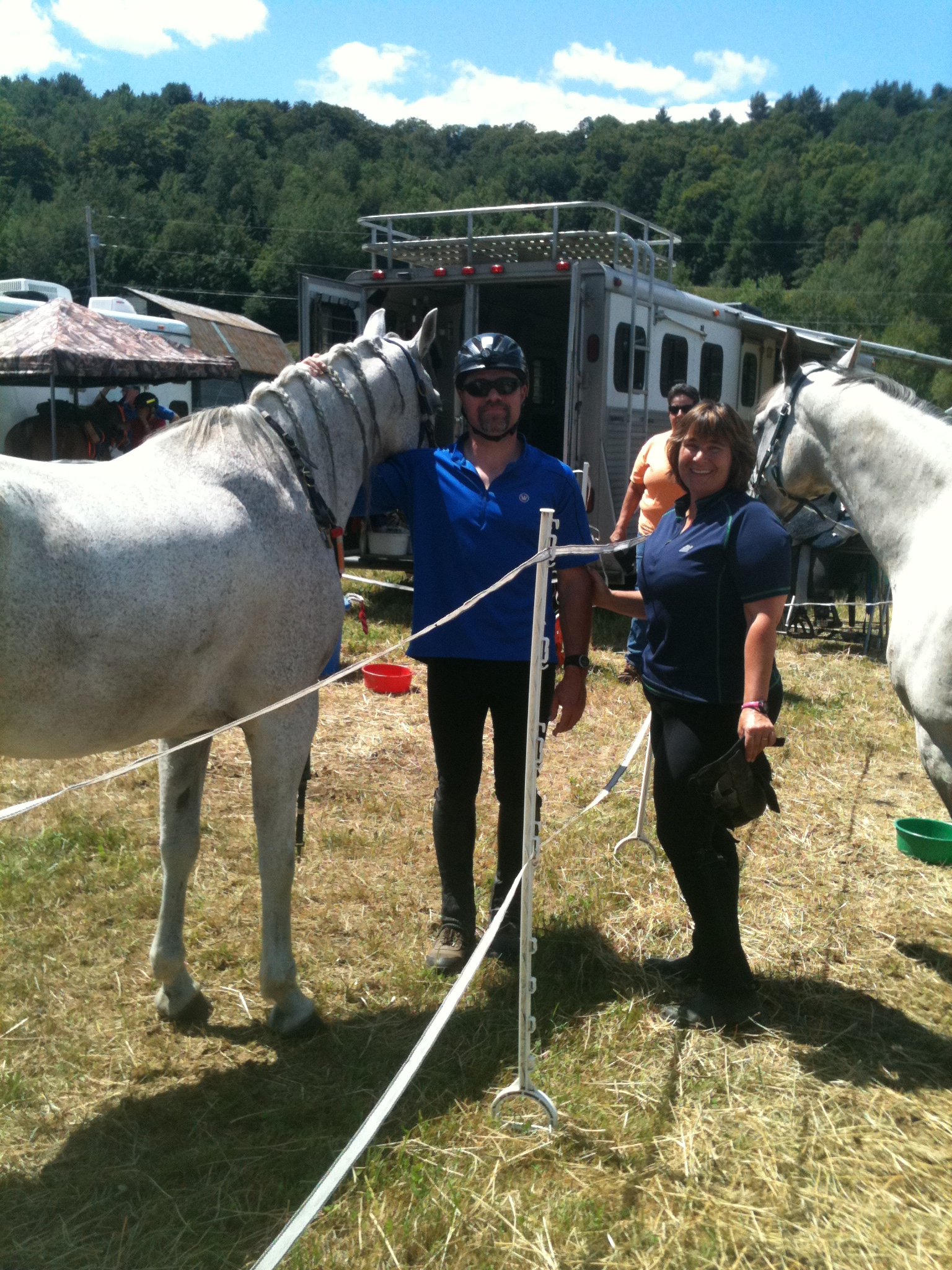Let’s clear up that love question first …
I have no idea if you can find love on the ‘net. I’ve been with Richard for over 20 years now and while I’ve had a few exes “friend” me on Facebook I’m quite confident that when they saw that I hadn’t aged as well as they’d hoped, they moved on to some other ex-girlfriend.
The phenomena of Facebook and folks seeking or giving advice about Endurance Riding is a topic that can get just about any Facebook user a little wound up.
In fact, a few weeks ago, I opted to take a break from social media, finding I was taking it all (and myself) just a wee bit too seriously. No regrets. (You’ll be surprised to hear that Facebook has gone on, quite ably, without my daily participation.)
So what is it that goes wrong when experienced competitors and folks new to the sport meet together on Facebook?
With just 15 years in distance riding and only a few thousand AERC miles, I think I fall right in the middle of both ends of the spectrum. Since I’ve been involved in teaching a lot of endurance riding clinics the last few years, I can see the source of frustration on both ends. It saddens me that the discourse gets so contentious.
The crusty old folks (COFs) in the sport, who have ridden more than a handful of horses thousands and thousands of miles, are somewhat dismayed about the following. [Disclaimer: I suspect that any endurance rider who qualifies to be a Crusty Old Folk (COF) would not be the least offended I would use that term. They would wear it like a badge of honor much like I embrace the nickname Mean Patti]:
- New folks seek advice and get it from everyone. From folks with years of experience in the sport, from folks with a bit of experience, and from folks who have never actually been to an endurance ride but read something once, somewhere, they think.
- Some new folks seem less risk-tolerant than the COFs were “back in the day.” Since many of the COFs started right out with 50s or even 100s, they are surprised that riders show such trepidation about a Limited Distance ride, or even an Introductory Ride.
- New folks seem somewhat obsessed with the “stuff.” Heart Rate Monitors, GPS, color-coordinated tack, which riding shoes they should wear. For those who started with whatever tack they happened to have, discovering (finally) the relief of wearing pantyhose under their Wranglers, and starting in the days when most everyone hauled their horse in a rusty two horse tag-along and slept in their pick up truck, there are folks lamenting, no doubt, the wussification of our sport.
- In some cases, the new folks seem to value the wisdom of other new folks more than they do the folks who have been around the endurance block (or heck, circumnavigated the globe) a few times. And the new folks sometimes seem to be happy to dole out advice, complete with lots of “always” and “nevers” after having completed their first ride, or season of rides.
Not to be dismissed, the New Folks seem to have some issues with the COFs too.
- COFs give advice as though everything is so simple, and it’s really not. “Just Do It” may work for Nike, but it can be a scary prospect for many of them. Getting a horse trained and conditioned for its first ride is a big deal and camping safely is not as easy as one might think, especially if you want to do it right and not have it end badly. And the new folks have plenty of opportunity, on Facebook, to hear how it ends badly, complete with graphic photos and first-hand accounts of disaster. Many of the COFs learned how to do things right by doing things wrong and the new folks would like to avoid that if they can. They need help and wish they could get it without being treated dismissively.
- COFs sometimes make fun of what the new folks find so exciting about the sport in some cases — tracking things, and picking out tack, and learning more and wanting to understand how various gadgets work. Don’t they remember what it was like to be new to something and passionate about all it entailed, including the color-coordinated things?
- COFs seem to see risk-aversion as weakness. A lot of the new folks are of a certain age. They can be risk averse, not only for themselves but for their horses too, and while they don’t mind being told that they’ve got ‘the goods’ to move up, they also don’t want to be told that wishing to continue to ride at the distance they are makes them ‘less than.’ It took a lot to get them here, and they’re rightly proud of themselves.
- COFs sometimes don’t seem to respect the fact that although someone may not have thousands of miles of endurance competition, they may have decades of experience with horses during which time they’ve learned a thing or three. And that they can separate good advice from not-so-great.
- COFs can be pretty darned nasty sometimes. Sometimes it’s not the information, it’s the tone. No one likes to be made to feel stupid. Or even ignorant.
So let’s say that this resonates with you, provides you with a little insight into where folks are coming from at the other end of the spectrum, where does that leave you, our gentle Facebook reader who, as Rodney King so famously wondered, “Can’t we all just get along?”

Here’s my advice for all those on Facebook, finding yourself in the quagmire:
- If you’re new to our sport, do a lot of reading. Before you ask, do a little reading, do a “search” on a Facebook page to see if someone has answered that question before. (They probably have.) Do a lot of reading of things that have been ‘vetted’ by AERC, things on the website. Most highly recommended if your goal is longevity in our sport, read the interviews of Decade Team riders about how they’ve managed to spend a full ten years riding their horse in 50+ mile rides. The interviews can be found here: AERC Decade Teams
- If you’ve been around for a long, long time, try to remember what it was like to be just starting out in the sport, afraid you’d hurt your horse, or more dangerously, unafraid that you’d do so. Think of all of the horses that, in the course of years and mistakes that brought you such wisdom and success, were caused discomfort by all those judgment faux pas — wouldn’t you like to save some other horse from another rider making the same error?
- If you’re new, try to separate the tone from the message. Is it possible that the COF who lacks subtlety has offered that same advice dozens of times before and been frustrated by someone who, for whatever reason, didn’t take it, and thus, have decided to couch their advice in less gentle terms?
- Seek first to understand. Ask the person why they’ve drawn the conclusion they have. Find some common ground. Use phrases like “in my experience” or “you may see things differently” or “it might be worth considering … ” or “what has worked for me and my horses.” Making a statement full of absolutes only begs others to show the contrasting view.
- If you’re a COF and you want to see our new folks learn the horsemanship values that you’ve earned, get involved with the AERC Mentor or Endurance 101 Clinic programs. I can guarantee that the couple of hundred folks who have been through the clinics I’ve been involved with facilitating will tell you they’ve been all about basic and fundamental straight-up horsemanship skills. (And not too much molly-coddling either. I wasn’t nicknamed Mean Patti because someone was being ironic.)
- Be polite. You don’t have to participate in every fight to which you’ve been invited. There are a million phrases that can be added here, most of them shared with you repeatedly by your grandmother. She was right, even though she never did get to participate on Facebook.
- If a conversation is too frivolous or too heated and divisive, just walk away. Either from that conversation or from Facebook for a good little bit. Take a walk, read a few Decade Team interviews or the blog of someone with several thousand more miles than you, ride your horse or just spend some time with him, look at the balance of his feet and listen to his gut sounds or heart rate one more time, palpate his legs, or clean your tack.
- Get to know real people in the sport in real life. Go to rides, go to clinics nearby and meet new folks or COFs. Tell them their horse is beautiful and get to know them. Watch them, see if you find they are promising, either as a mentor, or as a mentoree. Even if they have very few miles, they may be a horse training wiz, or an expert on hoof trimming and protection; what might they have to offer you?
After all, I’m pretty sure no one on their death bed says “I wish I’d participated in more catfights about shoes versus boots on Facebook.”
Happy trails.

